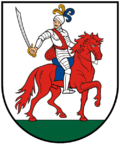Top Qs
Timeline
Chat
Perspective
Josvainiai
Town in Aukštaitija, Lithuania From Wikipedia, the free encyclopedia
Remove ads
Josvainiai is a small town in Kėdainiai district, central Lithuania. It is located on the Šušvė River 10 km southwest from Kėdainiai. The town comprises the Catholic All Saints Church, a gymnasium, a post office, a public library, a stud farm, and a culture house.[1]
Remove ads
Etymology
The name of the town derives from the hypothetical personal name Josvainis (a small river in the district of Krekenava also bears this name).[2] In other languages, the town was also previously known as: Polish: Jaswojnie.
History
Summarize
Perspective
Historians believe that there was a medieval castle in Josvainiai, attacked many times by the Teutonic Knights. In 1486 Josvainiai was mentioned as a town. During the 16th century, the royal manor of Josvainiai and the first wooden church were mentioned. In 1529 Josvainiai was included in the list of unprivileged towns of the Grand Duchy of Lithuania. During the wars of the 16th–17th centuries Josvainiai castle was devastated by Swedes.[1][3]
The town was granted city rights and a coat of arms on March 29, 1792. In 1831 the Josvainiai was occupied by anti-Russian rebels. At the end of the 19th century, during the Lithuanian press ban book smugglers were active in the area.[1]
During the Soviet occupation of Lithuania Josvainiai was a center of a selsovet and kolkhoz. In 1941 and again in 1947-49, 28 Lithuanian inhabitants of Josvainiai were forcibly exiled to Siberia by Soviet occupational authorities. Following the World War II, Lithuanian partisans of the Prisikėlimas military district of the Maironis Detachment were active in the outskirts of Josvainiai.[3]
On July 19, 2006, the town was granted a renewed coat of arms by a presidential decree.
Jewish community
Jews first settled in Josvainiai in the 17th century. By 1897, 534 Jews lived in the town, constituting 40% of the total population.[4] There was a synagogue and a Jewish school. Most Jews were expelled during World War I. In their absence, a large portion of the town burned down. After the War, some returned. Before The Holocaust, the Jewish population was 270 and included about 70 families.[5] They lived around the marketplace and on nearby streets. During World War II, 282 Jews were murdered in a mass execution: 86 men, 110 women, and 86 children.[6][7]
Remove ads
Demography
Images
- A mausoleum in the Josvainiai cemetery
- Šušvė in Josvainiai
- Josvainiai town center
- Bus stop of Josvainiai (now destroyed)
References
Wikiwand - on
Seamless Wikipedia browsing. On steroids.
Remove ads








